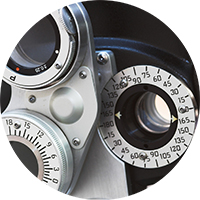Ophthalmic Services
Emergency Eye Care

Our doctors are on-call at all hours to handle any eye care emergencies and ensure that any injuries or other conditions are handled thoroughly and efficiently to minimize vision loss. We are experienced in providing comprehensive emergency care for a wide range of injuries and conditions, and will handle your individual issue with precise skill and compassionate care. In the case of a true emergency, we encourage patients to call 911.
The best treatment for an eye emergency can vary depending on the type and severity of the condition, as well as the visual and overall health of the patient. Common treatments include ice, aspirin, anti-inflammatory medications or surgery. It is important to take precautions to prevent these injuries from occurring in the first place, in order to preserve eye health.
Glaucoma Treatment
Glaucoma is an eye disease in which pressure inside the eye (intraocular pressure) rises dangerously high, damaging the optic nerve and causing vision loss. In a healthy eye, fluid is produced in the ciliary body, enters the eye, and then drains through tiny passages called the trabecular meshwork. In people with glaucoma, these passages become blocked and intraocular pressure rises. Some cases of glaucoma can be treated with medications. For others, laser or traditional surgery is required to lower eye pressure.
Diabetic Retinopathy Treatment
Diabetic retinopathy is a complication of diabetes that weakens the blood vessels that supply nourishment to the retina (the light-sensitive lining in the back of the eye where vision is focused). These weak vessels can leak, swell or develop thin branches, causing a loss of vision. Changes to your vision may not be noticeable at first. But in its advanced stages, the disease can cause blurred or cloudy vision, floaters and blind spots – and, eventually, blindness. This damage is irreversible. Diabetic retinopathy is the most common diabetic eye complication and a leading cause of blindness in American adults. Macular edema, which is leaking fluid that causes blurred vision, often occurs with diabetic retinopathy.
Although damage caused by diabetic retinopathy cannot be corrected, patients diagnosed with the condition can be treated to slow its progression and prevent further vision loss. Treatment modalities include laser and surgical procedures.
Contact Lens Fitting
There are many different kinds of contacts, including rigid and flexible, extended wear, disposable and planned replacement lenses. Some can be made as bifocals or in different colors. After a thorough eye exam and consultation with an experienced physician, patients who qualify for contact lenses can discuss which type is right for them. All contact lenses require special care and cleaning. You'll need to make regular follow-up visits to ensure your eyes remain healthy.
Optical Dispensary
We feature an optical shop with a wide array of eyeglass frames and contact lenses to suit every need and budget. We offer patients frames from many elite designers, as well as stylish yet affordable alternatives. We also carry a full line of frames for children and teens.
Our convenient onsite location also eliminates the hassle of having to take your prescription to another location in order to fill your vision correction needs. In addition to eyeglasses and contact lenses, we also provide sunglasses, sports glasses, goggles and other forms of safety and athletic eyewear.
For more information about Conditions & Treatments, or to schedule an appointment, please call 247.255.3515.

